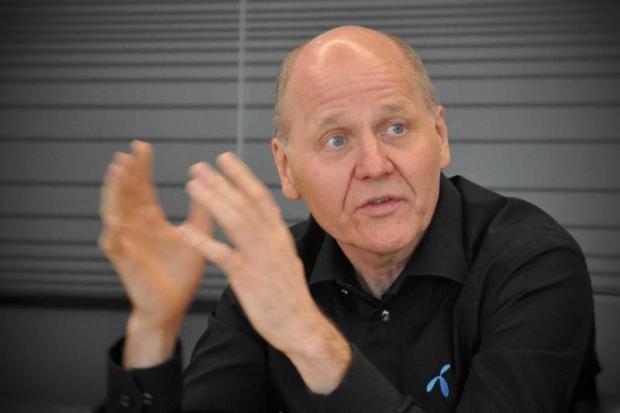
Telenor chief executive Sigve Brekke is pressing the government to grant payment extension facilities for future auctions if it decides to use Section 44 to relax the licence payment terms of Advanced Info Service (AIS) and True Move, the winners of the 2015 auctions.
Mr Brekke met Deputy Prime Minister Somkid Jatusripitak Wednesday to discuss some of the most pressing issues for Telenor's Thai mobile operating unit, Total Access Communication (DTAC). The first issue was the government's plan to invoke Section 44 to extend the winners' final licence payments over five years.
Somkiat Tungkitvanich, chairman of the Thailand Development Research Institute, previously pushed against using the executive order, saying AIS and True Move, which still owe 60 billion baht each, had decided to push forward with their auction bids in spite of the inflated price.
Mr Brekke urged the government to introduce a similar extension mechanism for the upcoming auction if it decides to go ahead with the payment extensions of AIS and True Move.
"I don't want to say if it is fair or not, but it definitely makes the last auction look more attractive in retrospect," he said. "Mr Somkid did not give me any guarantees, but said he would bring our concerns to TOT Plc and to the government."
Mr Brekke also urged Mr Somkid to help speed DTAC's partnership deal with TOT on the 2300-megahertz spectrum, noting that the delay is causing TOT to forgo 400 million baht a month in network leasing revenue. The deal has yet to be approved by the attorney-general.
The meeting came a few months after True surpassed DTAC as the second-largest mobile operator and three weeks after DTAC's head, Lars Norling, posted his resignation.
Mr Brekke said he is in talks with four or five candidates, both Thais and foreigners, to succeed Mr Norling, who is scheduled to depart on Sept 1.
DTAC has slashed its workforce and cut its marketing budget to prop up the bottom line. The company's lean strategy is an attempt to emulate digital service providers, which the company considers future competitors, Mr Brekke said.
DTAC is also facing the possibility that the planned 1800- and 850MHz auctions will not take place before its 2G mobile licence expires in September. Mr Brekke said DTAC's customers will experience uninterrupted services.
But the service revenue generated between September and the date on which DTAC secures its next 1800MHz spectrum licence will accrue to the National Broadcasting and Telecommunications Commission (NBTC).
Mr Brekke said the company is financially prepared to wait for the auction, even if the delay is longer than expected. "True remained in that state for two years, and AIS faces a similar situation," he said.
The problem, he said, is that the NBTC keeps changing its mind on the 1800MHz auction design: "The regulator seemed to have finally relented to the industry's efforts to shift the auctioned block size from 15MHz to a 5MHz licensing scheme. Days later, the NBTC came out saying that it had gone back to the 15MHz scheme again."
There is no clarity in terms of the 850MHz spectrum auction either, he said.
Most developed countries' auction spectrum is in 5MHz or even 1MHz blocks, which gives industry players more flexibility. Restricting the auction to larger blocks results in an artificial scarcity of spectrum and higher prices. "Even AIS and True may only need 10MHz each," Mr Brekke said.
"They ask me if DTAC will stay in the Thai market," said Mr Brekke, who served as DTAC chief executive from 2002 to 2008. "We have been here for 18 years, and we have faced hard times, but we always come back. In fact, DTAC is our group's second-largest market [in terms of revenue] after Norway."
DTAC, he said, is stockpiling cash for the coming transition into more data-heavy and tailored packages. While DTAC has lost share in the market as a whole, it has won a few percentage points in the postpaid sector, according to Mr Brekke.
Thai consumers are already the heaviest data users in the world, at 6GB per month, compared with 3GB a month in Norway.
"Today Thailand looks more like Norway than other markets in the region," Mr Brekke said. "Myanmar is what Thailand used to be 10 years ago."
Thailand already serves as the group's testing ground for digital technologies. This year, for example, the company is rolling out services like Line Mobile, introduced in Thailand last year, in Malaysia and Bangladesh.